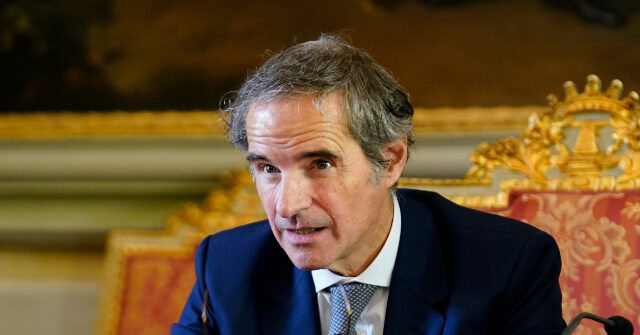Rafael Grossi, the director-general of the International Atomic Energy Agency (IAEA), confirmed this week that he would campaign to become the next secretary-general of the United Nations in 2026.
The current secretary-general, Antonio Guterres, is expected to complete his second term next year. He has been serving in that position since 2017. The U.N. employs a convoluted appointment process to choose its leader in which the Security Council, the massive global entity’s largest body, “recommends” a candidate for the title to be confirmed by the General Assembly, to which all member nations belong. Much of the campaigning takes place behind the scenes as those seeking the position attempt to convince the most powerful nations in the U.N. – the Security Council members – to choose them over other potential leaders.
Grossi has served as the head of the IAEA, one of the U.N.’s most powerful entities, since 2019. An Argentine career diplomat, he served his country as the ambassador to Austria from 2013 to 2019 and has an academic background in international affairs. Grossi has distinguished himself in the role for his aggressive condemnations of the failed implementation of the Joint Comprehensive Plan of Action (JCPOA) – the 2015 Iranian nuclear deal – and demands that Iran cease its illicit nuclear activity. Grossi’s report to the body on Iran’s uranium enrichment in June led to the IAEA issuing a resolution condemning Iran for the first time in two decades and immediately preceded American airstrikes on Iran’s largest known uranium enrichment facilities.
Grossi announced his interest in the secretary-general position on Wednesday, in response to a question from the Spanish news service EFE.
“I will be a candidate,” Grossi reportedly said plainly during a visit to Washington. He stated that the “wheel has started turning” on his campaign and that he would make his ambitions more official “in the next few weeks.” Grossi also suggested that, during his time in Washington, he had discussed his potential candidacy with American Secretary of State Marco Rubio.
The State Department confirmed that Rubio and Grossi met on Wednesday. The readout of that meeting, however, did not mention any discussion of the secretary-general position.
“They discussed global nuclear safety, including at Ukrainian nuclear facilities, and IAEA efforts to conduct monitoring and verification activities, including in Iran,” according to State Department Principal Deputy Spokesperson Tommy Pigott. “Secretary Rubio reiterated to DG Grossi the United States’ commitment to supporting the IAEA in promoting the peaceful use of nuclear technology and preventing the proliferation of nuclear weapons.”
Grossi is the first Latin American to run the IAEA and some reports on U.N. happenings suggest that, as per an unspoken tradition, the U.N. is set to choose a Latin American secretary-general during the next round of selection. He will face some headwinds, as several non-governmental organizations and advocates have called for the United Nations to name its first woman to the position following the end of Guterres’s term.
No official candidates have yet to surface for the position, but observers have floated several women who may succeed Guterres, many of them hardline leftists. Among them are authoritarian former New Zealand Prime Minister Jacinda Ardern; former Chilean President Michelle Bachelet, who vacated the top U.N. human rights position in disgrace after failing to condemn China’s genocide of the Uyghur people; and the head of the International Monetary Fund (IMF), a vocal believer in an imminent “unmitigated climate crisis” that poses an “existential threat to humanity.”
Grossi enters the secretive race a time of significant turmoil for the IAEA, in part due to threats to his person from Iran, the world’s premier state sponsor of terrorism. In June, Grossi presented to the IAEA board a damning report on the status of Iran’s nuclear activities, accusing it of repeatedly violating its international legal obligations.
“Unfortunately, Iran has repeatedly either not answered, or not provided technically credible answers to the Agency’s questions” about mystery nuclear sites, Grossi stated. “It has also sought to sanitize the locations, which has impeded Agency verification activities.”
“Arising from this, the Agency also concludes that Iran did not declare nuclear material and nuclear-related activities at these three undeclared locations in Iran,” he added. “As a consequence of this, the Agency is not in a position to determine whether the related nuclear material is still outside of safeguards.”
Grossi’s report led to the IAEA passing a resolution condemning Iran as being in violation of its obligations as per the Non-Proliferation Treaty (NPT) that week. Days later, President Donald Trump announced that the United States had “completely and totally obliterated” three Iranian enrichment sites: those at Fordow, Natanz, and Isfahan.
The Iranian regime rapidly turned to threatening Grossi personally.
“Once the war is over, we will settle accounts with Grossi,” Ali Larijani, a senior adviser to “supreme leader” Ayatollah Ali Khamenei, warned after the airstrikes. A Foreign Ministry spokesman, Esmail Baghaei, scolded the IAEA chief.
“You betrayed the non-proliferation regime; You’ve made IAEA a partner to this unjust war of aggression; You turned IAEA into a tool of convenience for non-NPT members to deprive NPT members of their basic right under Article 4. Any clear conscience?” Baghaei wrote on social media.
Some rumors based on “sources” this week suggested that the United Nations was forced to provide extra security for Grossi as a result, though these originated in disreputable publications.
Follow Frances Martel on Facebook and Twitter.
Read the full article here


